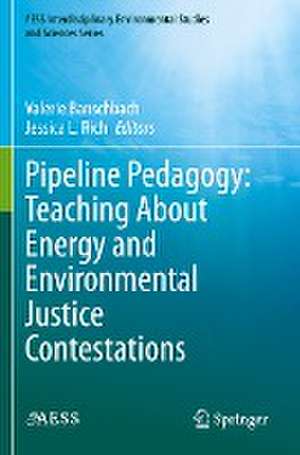Pipeline Pedagogy: Teaching About Energy and Environmental Justice Contestations: AESS Interdisciplinary Environmental Studies and Sciences Series
Editat de Valerie Banschbach, Jessica L. Richen Limba Engleză Paperback – 8 mar 2022
| Toate formatele și edițiile | Preț | Express |
|---|---|---|
| Paperback (1) | 721.01 lei 6-8 săpt. | |
| Springer International Publishing – 8 mar 2022 | 721.01 lei 6-8 săpt. | |
| Hardback (1) | 727.97 lei 3-5 săpt. | |
| Springer International Publishing – 7 mar 2021 | 727.97 lei 3-5 săpt. |
Preț: 721.01 lei
Preț vechi: 879.28 lei
-18% Nou
Puncte Express: 1082
Preț estimativ în valută:
137.97€ • 147.53$ • 115.03£
137.97€ • 147.53$ • 115.03£
Carte tipărită la comandă
Livrare economică 17 aprilie-01 mai
Preluare comenzi: 021 569.72.76
Specificații
ISBN-13: 9783030659813
ISBN-10: 303065981X
Ilustrații: XIV, 160 p. 9 illus., 6 illus. in color.
Dimensiuni: 155 x 235 mm
Greutate: 0.25 kg
Ediția:1st ed. 2021
Editura: Springer International Publishing
Colecția Springer
Seria AESS Interdisciplinary Environmental Studies and Sciences Series
Locul publicării:Cham, Switzerland
ISBN-10: 303065981X
Ilustrații: XIV, 160 p. 9 illus., 6 illus. in color.
Dimensiuni: 155 x 235 mm
Greutate: 0.25 kg
Ediția:1st ed. 2021
Editura: Springer International Publishing
Colecția Springer
Seria AESS Interdisciplinary Environmental Studies and Sciences Series
Locul publicării:Cham, Switzerland
Cuprins
Cross-disciplinary Learning and Pedagogical Lessons from the Mountain Valley Pipeline.- Learning to Undermine a Pipeline: A Multi-Logue on Encounters with Vermont’s Addison Natural Gas Project.- We are Teachers and Learners Together: Cross-Disciplinary Lessons from the Pilgrim Pipelines Dispute.- Teaching Environmental Justice Through Toolkits: Indigenous Projects to Challenge Colonialism.- The Stop PennEast Pipeline Fieldwork Project: Teaching Students to Apply Fieldwork Methods to Studying a Natural Gas Pipeline Opposition Movement.- Extractive Messaging: Communicating Pedagogy, Pipelines, and Power.- Mountain Valley Pipeline: A Case Study in Local Resistance and Mobilization.- The Dakota Access Pipeline and the Politics of Sustainability Education at Central College.- Climate Justice: Linking Sovereignty, Local Environments, and Climate Through Pipeline Pedagogy.
Notă biografică
Valerie S. Banschbach, Ph. D., is an Associate Provost and the Dean of Sciences and Education, at Gustavus Adolphus College, in St. Peter, Minnesota. She has conducted research focused on social insect behavior and conservation ecology, as well as developed innovative pedagogy and curriculum in Environmental Studies. She has taught and conducted fieldwork with students in Costa Rica, India, Kenya, Mexico, Panama, and Uganda, as well as Vermont and Virginia, in the U.S. She co-edited the volume Animals in Environmental Education: Interdisciplinary Approaches to Curriculum and Pedagogy (in 2019, Palgrave MacMillan) and has published numerous scientific journal articles. She is the President of the Association for Environmental Studies and Sciences. Valerie earned an Outstanding Faculty Award for the State of Virginia from the State Council for Higher Education, while she was a Professor and Chair of the Environmental Studies Program at RoanokeCollege is Salem, VA. She was awarded a Fulbright-Nehru Senior Scholar grant for teaching and research in Uttarakhand India.
Jessica Rich (Ph.D., University of North Carolina at Chapel Hill) is an organizational and environmental communication scholar and practitioner researching labor, identity, and nature-society interactions in the context of energy and natural resource development. Her publications can be found in the journals, Environmental Communication, Ephemera, and Sustainability. She has served as joint faculty in Communication and Environmental Studies at Merrimack College, developing and teaching courses such as environmental communication, environmental justice, conflict management, and non-profit communication and held the position of postdoctoral research associate with the Cooperative Institute for Environmental Science and the Center for Science and Technology Policy Research at the University of Colorado, Boulder.
Textul de pe ultima copertă
The proliferation of pipelines to transport oil and natural gas represents a major area of contestation in the landscape of energy development. Battles over energy pipelines pit private landowners, local community representatives, and environmentalists against energy corporations and industry supporters, sometimes drawing opposition and attention from well beyond the impacted regions, as in the case of the Standing Rock/Dakota Access Pipeline. Stakeholders must navigate complex government regulatory processes, interpret technical and scientific reports, and endure lengthy and expensive court battles. As with other forms of environmental injustice, the contentious construction of pipelines often disproportionately impacts communities of lower economic development, people of color, and indigenous peoples; pipelines also pose potential short and long-term health and safety threats. With the expansion of energy pipelines carrying fracked oil and gas across the United States and abroad, the moment is ripe for teaching about pipeline projects and engaging students and community members in learning about methods for mobilization. Our volume examines pedagogical opportunities, challenges, and interventions that campus-community engagement, and other kinds of community engagement, produce in relation to infrastructuring in the form of pipeline development.
Caracteristici
Demonstrates the power of interdisciplinary environmental studies and sciences to challenge pipeline development Provides teachers with purposeful practices of campus-community engagement in relation to environmental conflicts Connects the critical perspectives of scholar-teachers with experiences from the frontlines of environmental protest









